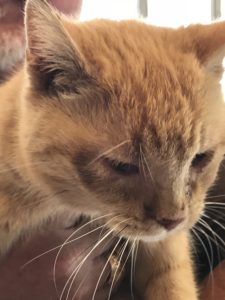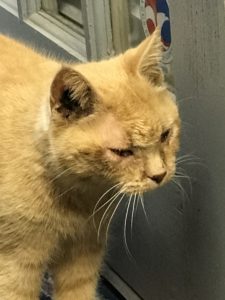Is Your Cat Allergic To Its Food?

Down here in Houston, Texas it’s not uncommon to hear people complain about their allergies. Even cats can develop allergies not only to airborne irritants but to the ingredients in their food. How do you know if your cat has a food allergy? What are the symptoms and the most common ingredients that can lead to food allergies in cats? And what can you do about them?
I met an amazing cat mom, Leanne, this week who works at a neighborhood landscaping company when I dropped off a payment. She shares her home with seven cats and has started feeding an abandoned kitty who likes to hang around the grounds of the landscaping company. The cat’s former owners who lived across the street left her behind when they moved out. While that’s heartbreaking enough, this precious kitty used to live indoors; now she has to live outdoors and has to fend for herself.
She has always had runny, watery eyes with a little redness. It was unclear whether she had a respiratory illness, an infection of some kind, or something else. I asked Leanne to send me a picture of the kitty because unfortunately she wasn’t around when I was there. A short time later I received a number of photos and could see for myself.
Using muscle testing I was able to determine it was not a bacterial infection or a virus; it was food allergies! Testing the most common ingredients in cat food I found the two culprits: corn and soy. The kitty eats a dry kibble diet that looked like common cat food sold in grocery stores. Kibble foods are commonly loaded with corn, soy and other carbohydrates because they’re cheap and the carbs are needed to make the kibble stick together.
What are common symptoms of food allergies in cats?
While symptoms vary from cat to cat, some of the most common symptoms of food allergies can include:
- GI upsets like vomiting and diarrhea
- Skin problems like rashes, hot spots and inflammation
- Ear infections
- Respiratory conditions like sneezing, coughing and wheezing
- Itchy, runny eyes
- Snoring caused by an inflamed throat
- Paw chewing/swollen paws
Why do cats develop food allergies?
According to Dr. Karen Becker, DVM, there are several reasons. The most common one is overexposure. Cat parents feed their cats the same diet day in and day out with little to no variance. Over time this can create sensitivity and the immune system becomes overstimulated.
The second reason is because the food is biologically inappropriate for cats to eat. Many pet food companies use carbohydrates like corn, wheat, potatoes, rice, soy, and other starches to reduce the amount of meat in the food. This saves the company a lot of money because carbs are cheaper than proteins. Over time these food create stress on the immune system which triggers an allergic response.
Other triggers include “emulsifiers, flavor enhancers, dyes, and preservatives, not to mention the hormones and chemicals passed up the food chain in the meat found in pet foods. All of these can lead to food intolerances which can escalate to systemic allergic reactions.”
Finally, low quality, rendered sources of protein are also to blame: “Hooves, feathers, or beaks – have the potential to initiate an allergic reaction” in your cat.
Common ingredient culprits
The most common ingredients that can trigger allergic reactions include:
- Corn
- Wheat, wheat gluten
- Rice
- Soy, soybean oil
- Eggs
- Milk
- Yeast
- Potato
- Beets
- Chicken
- Fish
How do allergies actually develop?
Dr. Becker gives a great explanation:
In a healthy body, the food that is eaten will be broken down into single amino acids and nutrients which pass from the GI tract into the bloodstream, where the body can make good use of them.
The GI tract is a semi-permeable barrier that is designed to thoroughly absorb nutrients that have been totally digested but keep out partially digested nutrients, as well as other indigestible things pets eat.
The GI tract plays a very important role in keeping out allergens and allowing in nutrients. If partially digested foods pass through the GI wall and into the bloodstream, the immune system will mount a massive allergic reaction triggered by these foreign invaders.
These pets all have dysbiosis – that’s the medical term. The layman’s term is leaky gut. All of these animals will have the same immune system response every time they eat the food they have become sensitive to. That response is what results in symptoms of chronic allergies.
How can you help your cat overcome these allergies?
Introduce a different or novel protein. If your cat’s food has been primarily chicken, switch to turkey, pork, duck, lamb or beef. If you feed a kibble food switch to one that has a a different carbohydrate, ie: from corn to rice or from wheat to potato. You’ll need to stick with the new diet for at least two months. For BEST results eliminate the carbohydrates and kibble and introduce a high quality, protein based wet food diet. Ideally the total carbohydrates should not be greater than 5%.
Adding a high quality probiotic to heal the gut is extremely beneficial. Detoxing the liver with supplements like milk thistle will help the body eliminate toxins as the gut heals.
Consider having some energy work like ECR (energetic cellular release) done to help neutralize the cellular memory to the allergens. This aids in healing and preventing sensitivities to ingredients that are highly beneficial. For example, chicken is a great protein for cats to eat, and it’s commonly found in cat food. Being able to eat it again without triggering an allergic response would be beneficial. I wouldn’t recommend adding poor ingredients like corn and soy back into the diet after ECR clears them because these foods are not ideal for a cat’s diet to begin with.
Rotate proteins. Don’t feed your cat the same food all the time. Give her some variety!
Once you remove the triggers use homeopathy to help cure symptoms like allergic reactions, swelling, and hot spots if needed. You can also boost the immune system with whole body supplements and a daily dose of colloidal silver for awhile. Muscle testing is the ideal way to determine exactly what your cat’s body needs.
Prevention is the best way to avoid food allergies in cats
If your cat’s food allergy is left untreated it can lead to a host of health problems. When the immune system is overstimulate this leads to inflammation. The long term result can lead to auto-immune diseases, cancer, lymphoma, IBD, heart disease, hyperthyroidism, diabetes and more. The reality is your cat’s lifespan is at stake. With all this in mind, what can you do?
Make it a habit to read your cat’s food label. The main ingredient should be meat, not carbohydrates. If possible provide a fresh, homemade raw or lightly cooked diet. High quality canned cat food may be an easier option. Eliminate or if possible greatly reduce the amount of kibble you feed your kitty. This will help reduce exposure completely to many of the common allergens found in cat food.

Kitty loves to visit the landscaping office
As for the sweet kitty who hangs out at the landscape company, she needs an immediate change in her diet. I have tasked Leanne with finding a new food for her that doesn’t contain corn or soy. She would also benefit greatly from milk thistle to detox her liver, homeopathy to eliminate her watery eyes, and a great probiotic to rebuild her gut. Despite her rough start I’m hoping Leanne and I can put her on a path to healing and give her a better, healthier future.
Has your cat experienced a food allergy? What course of action have you taken? Share in the comments below! Share this post on your favorite social channel and sign up here to follow our blog!

